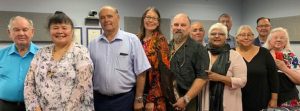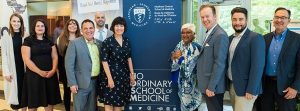Hello. Bonjour. Aaniin. Boozhoo.
These two weeks have taken me to Thunder Bay several times and meetings around Ontario, with more plans to travel to where NOSM must be represented; including communities further north, and at the Council of Ontario Faculties of Medicine, and the Association of Faculties of Medicine of Canada and the Colleges.
It is critical that NOSM is seen in all these places, because NOSM is truly unique. No other voice can adequately represent the Northern perspective on health-care education. If not, we risk being unheard or left out of competing province-wide decisions and national strategies in resource allocation and policy-making. No other school of medicine has a mandate such as NOSM, and no other part of Ontario suffers the health disparities and inequities as the North.

NOSM was the first medical school in Canada established with an explicit social accountability mandate. This means that NOSM is dedicated to addressing the priority health concerns of the people and communities of Northern Ontario. The health factors that make the North unique are difficult issues to highlight but in the next five years I intend to keep the “pedal on the metal” to ensure that progress is made. I intend to reopen our definition of social accountability. I will be asking all of you What do you think it really means to be socially accountable? That mandate, in my humble opinion, needs to be opened up to reinvest in aggressive advocacy, influencing policy and the renewal of our commitment to the North.
The HARD Facts: The needs of the North are different. So are our doctors.
Northern Ontarians have shorter expected lifespans than people in Southern Ontario, and are far more likely to die prematurely (before age 75) from suicide, heart disease or respiratory disease. Northerners have less access to primary care providers, and higher rates of suicide, complex chronic diseases, obesity and are more likely to report having multiple chronic conditions.[1]
Mental health and addictions in the North are some of its greatest challenges. The youth suicide rate of Indigenous people is six times higher than non-Indigenous youth in Canada.
The northeast and northwest have the first- and second-highest rates of opioid-related deaths in the province, which poses intimate, heart-wrenching challenges for the well-being of families, workplaces, and communities in the North. Children and youth are presenting at emergency departments with opioid addictions every day.[2]
Delivering health care in the North involves navigating between two systems of health services by two levels of government. One is provincially funded and the other is federally funded. Our learners and graduates must maneuver a complex system depending on where they choose to work. Are they prepared for this?
Northern and rural physicians must have a uniquely northern skill set – this must be intentionally taught and it must be properly remunerated. Northern docs have 24/7, 365 day workloads, inadequate specialty support and increasing numbers of unattached patients. Advocacy is required for sustainable workforce planning and appropriate payment models.
Social Determinants of Health
The North of Ontario has unique social determinants of health. Climate change is affecting these in the most powerful way, but where is this taught in our curriculum?
What we’re noting as a collective academic medical community are the new, emerging social determinants of health that I’ve mentioned before, including: barriers to nutritious food, lack of clean safe water, lack of safe housing and threats to personal safety. For example, climate-related changes including wildfires, flooding and shorter seasons of ice road access have a direct impact.
Chronic disease – such as diabetes is endemic. And is not only limited to an aging population but children and adolescents are severely affected. I met with our TBRHSC Department of Pediatrics faculty last week and they expressed grave concerns about their ability to meet the growing needs of the children of the North.
These are unique social determinants of health and realities for communities in the North of which NOSM learners must be familiar. NOSM must push the boundaries of curricular change to prepare rural physicians. To this end, NOSM will be developing a new pathway- the rural generalist pathway – with defined sets of competencies and expectations for physicians who practice here.
So, Here’s the Bottom Line
Since 2011, there are 214 NOSM-educated family physicians and 31 NOSM-educated specialist physicians now practising in the North. We strive to increase these numbers.
Being unique is a strength. We admit applicants who, in most cases, already have a lived experience and deeper understanding of the North. For physicians to become “agents of change,” our curriculum must prepare them for the unique challenges of practice in the North.
As medical academics, we are a key voice at the table of health care transformation. These are exciting times as provincial and federal policy-makers and influencers recognize that we have evidence-based knowledge and appropriate solutions that are unique to the North and that work. Having just been at the Canadian Medical Association Health Summit this week, and hearing Dr. Mike Kirlew speak eloquently about Indigenous health, I hope that by raising our voices on behalf of the North at policy forums and at meetings and conferences, we will bring attention to our needs for medical school expansion, innovation in models of education and advocacy for our challenges in health care delivery.
|
Recruiting for Two Senior Positions The Northern Ontario School of Medicine is seeking two dynamic, innovative, collaborative, and enthusiastic leaders to fill senior positions at the School—one for Associate Dean, Postgraduate Medical Education and Health Sciences Programs, and one for Associate Dean, Research, Innovation, and International Relations. Both Associate Dean’s will become part of NOSM’s Executive Group, the most senior administrative body for operational matters at the School. Find out more about the Associate Dean, Postgraduate Medical Education and Health Sciences Programs position and the Associate Dean, Research, Innovation, and International Relations positions. |






